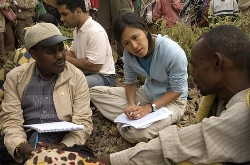
Contact: Liz Lucas, Press Officer, Oxfam America, 617-728-2575, 617-785-7772 cell, llucas@oxfamamerica.org
MEDIA ADVISORY, Jan. 19 /Standard Newswire/ -- New public health practice is part of a three-pronged effort to sharpen the effectiveness of the agency's emergency response. The other two components are livelihoods and disaster preparedness. This is the first of a two-part series that will look at the new and more comprehensive direction the emergency department is taking.
Photo: Photo: Brett Eloff/Oxfam
When an outbreak of cholera rippled across
The work is part of Oxfam
"Public health assessments provide true evidence of a problem, and they are a lot more effective than rhetoric in focusing attention on the issues," said Miriam Aschkenasy, an emergency medicine physician and Oxfam
Hired in July to head the initiative, Aschkenasy will work on a variety of projects as the agency begins to map out its public health priorities and build a network of specialists who could respond in humanitarian emergencies when the need arises.
"Public health was going on, but no one was calling it public health," said Aschkenasy. "Some of the grants Oxfam awarded to partners were addressing problems such as diarrhea, HIV/AIDS, and access to care. All of these are public health issues, but they didn't fall into a particular person's portfolio. As the humanitarian response department did more of this work, it became apparent it needed someone who specialized in this area."
But Aschkenasy is not undertaking this task alone. A key component of the new program calls for collaboration between Oxfam and top medical facilities, many of which are located in
"Here in
Health Concerns in
Twice since last summer, teams from HHI have been dispatched to
In the first instance, an outbreak of ethnic fighting in the southern part of the country had forced tens of thousands of people to flee their homes and seek safety in the bush. Hunger, exposure to the elements, and extremely limited water supplies had begun to take a toll on many of those who had fled. Oxfam and HHI sent a small team—two doctors and a humanitarian response specialis--to conduct a rapid assessment of the situation and offer ideas for improving it.
"The humanitarian needs among the internally displaced people in both the Guji and Borena zones are significant," said Jennifer L. Chan, one of the Harvard doctors, after the visit. "At the time of the HHI/Oxfam assessment, immediate food, shelter, and non-food items were needed as well as establishment of long-term peace building activities." Oxfam had already provided some emergency assistance prior to the assessment.
Three months later, Oxfam and HHI sent a second team to
"The idea behind the assessments is to provide a superior response," said Aschkenasy. "Our affiliation with HHI does that. It provides us with a cadre of cutting edge public health professionals, academics, and their resources. And the evidence they help us gather strengthens our ability to call for change."
Launching an Early Warning System
Aschkenasy will help lay the groundwork for some of that change when she travels to
In Moyale, a dusty border town between
They sound like simple questions, but their answers--plotted on a chart that can make trends frighteningly clear--could be key to getting people in this drought-prone region, many of whom are herders and extremely poor, the help they need before it's too late.
"If we can determine quickly what the effects of limited rainfall are, then we can start doing interventions long before things get so bad that severe malnutrition becomes widespread and feeding centers are our only recourse," said Aschkenasy.
Following Her Heart
A fellow at HHI, Aschkenasy keeps her medical skills honed by working four eight-hour shifts a month at the
"When I was in my second year of residency, I had a chance to go to
And that's a central objective for Oxfam's humanitarian response department: preventing events--natural or man-made--from cascading into disasters.
"Public health ties right in with our preparedness and livelihoods work. That triad is what development is all about," said Aschkenasy.




 Sign Up to Receive Press Releases:
Sign Up to Receive Press Releases: